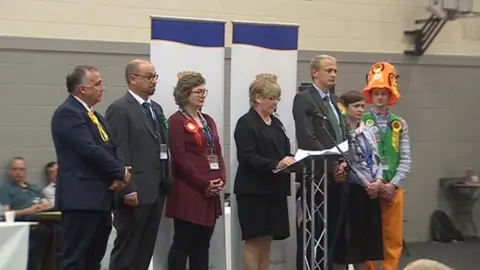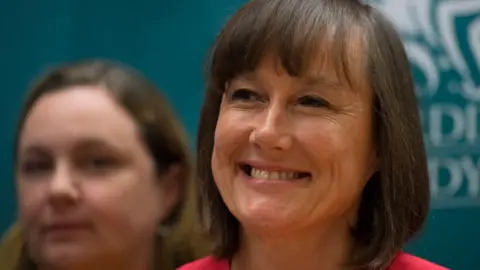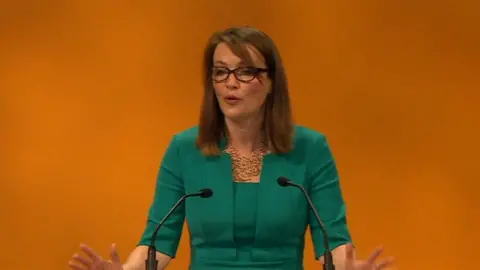State of the parties: The Welsh Liberal Democrats
 BBC
BBCIn the fourth of our summer series looking at political parties, BBC Wales' Tomos Livingstone examines the Welsh Liberal Democrats.

"There is still a party out there that wants to win and fight on and fight on we will."
Confirming your continued existence isn't on any political party's list of fun things to do, but former MP Mark Williams was performing a necessary public service when he uttered the words on BBC Radio Wales' Sunday Supplement a few days ago.
Mr Williams was the party's sole Welsh MP, but in June he lost Ceredigion by 104 votes to Plaid Cymru's Ben Lake.
The former teacher is one of Welsh politics' more jovial figures, but he could be forgiven for reflecting darkly that he might in fact have been one of the lucky ones - at least some people actually voted for him.
There are 40 constituencies in Wales and in 36 of them the Liberal Democrats lost their deposit. That means failing to secure 5% of the vote and thus giving up the £500 candidates have to stump up. The system is supposed to deter time-wasters - you can insert your own joke here, if you like.
In the four remaining seats the party was second in three - Ceredigion, Montgomeryshire and Brecon and Radnorshire - but only in the first was it anywhere near winning.
In its other target seat, Cardiff Central, which was Lib Dem until 2015, it slipped to third place.
There are more statistics available - vote share down to 4.5%, for instance - but going through them all seems a bit cruel.
 Getty Images
Getty ImagesSo let's be a bit more constructive and ask what went wrong and what the Lib Dems might be able to do about it.
The Liberal Democrats were clearly hoping that running a campaign centred on a promise of a second EU referendum would be enough to attract a sizeable chunk of the 48% who voted Remain in 2016.
But it did not happen - there is increasing evidence those Remainers who remain motivated by the EU issued largely plumped for Labour this time around, despite the well-publicised ambiguities in that party's actual European policy.
Mr Williams blamed a "useless" national campaign and it is clear Tim Farron did not enthuse the electorate.
There may still be some residual anger among ex-Lib Dems over the 2010-15 coalition with the Conservatives and there are always the dull realities of declining representation for any political party - less cash (those lost deposits alone cost £18,000), fewer councillors to contribute time and money and the surprisingly quick onset of organisational atrophy.

When will there be good news?
Salvation may have to wait until the assembly elections in 2021. The Lib Dems have a sole AM, Kirsty Williams, but she is the education secretary and will at least give the party a record in office to campaign on.
It is also the case that the assembly electoral system is designed to support a four-party system, which is great until you slip from fourth to fifth place.
But with UKIP struggling both to define itself in the post-referendum era and to adapt to the daily realities of representing the people in the Senedd, it is likely the crucial fourth slot will be genuinely competitive again.
The Lib Dems may not need a huge surge to get back to, say, four or five AMs.
The continued fluidity of UK politics could help too - both the Conservatives and Labour may struggle over the coming years to remain united over Brexit and the Remain-focused may turn back to the Lib Dems.
New leader Sir Vince Cable already sounds open-minded about another big unknown - the emergence of a new party on the centre-left.
Mr Williams, though, suggests the answer really lies not on the national stage but on a pavement near you - grassroots campaigning on the things people care about in their own communities.
It seems like a good place to start.
